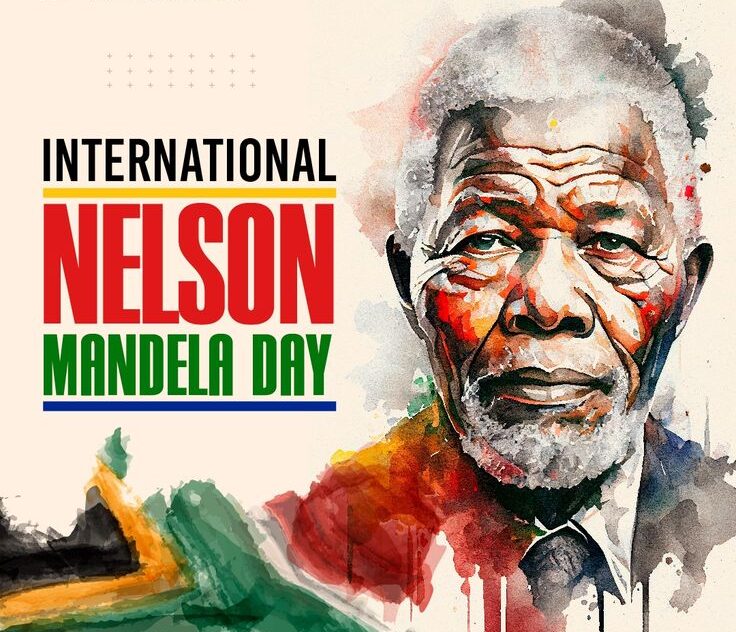Nelson Mandela International Day: Celebrating a Legacy of Compassion and Justice
Introduction
Nelson Mandela International Day is an annual celebration of the life and legacy of one of the most influential figures in modern history. Observed every year on July 18th, the day honors Nelson Mandela, the former president of South Africa, anti-apartheid revolutionary, and a global symbol of peace, justice, and human dignity. Mandela’s efforts toward ending apartheid, his advocacy for human rights, and his commitment to social change continue to inspire millions around the world.
Through this special day, we not only celebrate Mandela’s incredible life but also reflect on how his work can inspire us to contribute positively to society. This observance calls for individuals and communities to commit 67 minutes of their time to making a difference, echoing Mandela’s 67 years of service to humanity.
History of Nelson Mandela International Day
The United Nations declared July 18th as Nelson Mandela International Day in 2009 in honor of Mandela’s 91st birthday. This special day was established to promote his values of peace, reconciliation, and social justice, and to encourage people to continue his work in their own communities.
Mandela’s journey from being imprisoned for 27 years to becoming South Africa’s first Black president in 1994 is one of the most remarkable stories of resilience, courage, and forgiveness in history. He spent his life advocating for racial equality, justice, and the dismantling of apartheid, and he spent his later years championing causes such as education, healthcare, and poverty alleviation.
The decision to dedicate a day to Nelson Mandela is a tribute to his enduring impact on the world, encouraging individuals to take meaningful action in the spirit of Mandela’s life’s work.
Important Facts About Nelson Mandela International Day
- Early Life and Education: Nelson Mandela was born Rolihlahla Mandela on July 18, 1918, in the village of Mvezo, in the Eastern Cape of South Africa. His birth name, “Rolihlahla,” means “pulling the branch of a tree” or “troublemaker,” a name that symbolized his future role in challenging the status quo.
- Activism and Imprisonment: Mandela joined the African National Congress (ANC) in 1943 and became a leader in the fight against apartheid. In 1962, he was arrested and convicted of sabotage and sentenced to life in prison. Mandela spent 27 years in prison, enduring harsh conditions, but remained unwavering in his commitment to his cause.
- Release and Presidency: In 1990, Mandela was released from prison after international pressure on the apartheid government. His release marked the beginning of a new era for South Africa. Four years later, Mandela became South Africa’s first Black president in a historic election, marking the official end of apartheid.
- Nobel Peace Prize: In 1993, Nelson Mandela and South African President F.W. de Klerk were awarded the Nobel Peace Prize for their efforts in peacefully ending apartheid and fostering reconciliation in South Africa.
- Mandela’s Legacy: Mandela’s impact extended far beyond his political achievements. He became a global ambassador for peace, promoting reconciliation, nonviolence, and justice throughout the world. He also dedicated his life to advocating for healthcare, education, and social justice.
Significance of Nelson Mandela International Day
- Promoting Peace and Reconciliation: Mandela’s leadership was characterized by his ability to unite a fractured nation. His emphasis on forgiveness, reconciliation, and inclusivity during South Africa’s transition from apartheid is a model for conflict resolution around the world. International Day encourages individuals to promote peace in their own lives, communities, and countries.
- Encouraging Community Engagement: Nelson Mandela International Day emphasizes the power of individuals in making a positive difference. The 67 minutes of action that people are encouraged to commit each year symbolize the 67 years Mandela devoted to serving humanity. Whether it’s volunteering, helping others, or contributing to community development, these actions reflect Mandela’s dedication to social change.
- Advocating for Human Rights: Mandela spent his life fighting against the violation of human rights. His relentless struggle against apartheid serves as a reminder to stand up for the rights of the marginalized, oppressed, and disenfranchised. International Mandela Day encourages people to fight for equality and justice on a global scale.
- Inspiring Leadership and Integrity: Mandela’s leadership qualities—such as resilience, empathy, and unwavering principles—serve as a model for those in positions of power. His humility and integrity are qualities that inspire individuals to lead with compassion, understanding, and commitment to justice.
- Celebrating Education: Mandela believed that “education is the most powerful weapon which you can use to change the world.” His focus on improving access to education for all is a crucial part of his legacy. International Mandela Day encourages efforts to improve education in communities, whether by donating books, tutoring, or supporting educational initiatives.
Impact on Daily Life and Society: Nelson Mandela International Day
- Volunteerism and Social Responsibility: Every year on July 18th, individuals around the world are encouraged to volunteer their time and skills to help others. Whether it’s working at a local shelter, cleaning up the environment, or helping to educate children, these small acts of kindness contribute to making the world a better place.
- Mandela’s Message of Hope: Mandela’s story of overcoming adversity is a source of hope for countless people. His journey demonstrates that positive change is possible, even in the most difficult circumstances. In the face of poverty, inequality, and conflict, Mandela’s life reminds us that change is always within reach if we are committed to working for it.
- Cultural Unity and Respect: Mandela advocated for a united, inclusive South Africa, where people of all races and backgrounds could live together in harmony. International Mandela Day calls attention to the importance of cultural understanding, respect for diversity, and collaboration for the greater good.
- Building Stronger Communities: Mandela believed in the power of communities to effect change. International Mandela Day inspires people to work together to address issues like poverty, hunger, and inequality in their own neighborhoods. Stronger communities are built when individuals come together to support each other and make a positive impact.
FAQs About Nelson Mandela International Day
1. Why is Nelson Mandela International Day celebrated?
Nelson Mandela International Day is celebrated to honor the legacy of Nelson Mandela, his lifelong commitment to justice, peace, and human rights, and to encourage people to contribute positively to society.
2. What does the 67 minutes symbolize?
The 67 minutes represent the 67 years that Nelson Mandela dedicated to fighting for human rights and social justice. It is a call to action for individuals to give 67 minutes of their time to serve their communities.
3. How can I participate in Nelson Mandela International Day?
You can participate by volunteering, supporting social justice initiatives, educating others about Mandela’s legacy, or simply reflecting on how you can make a difference in the world.
4. What is the significance of Nelson Mandela’s quote, “Education is the most powerful weapon”?
This quote emphasizes the transformative power of education. Mandela believed that education was key to creating a fairer, more just society and breaking the cycle of poverty.
5. How can I honor Mandela’s legacy beyond International Day?
You can honor Mandela’s legacy by embodying his values of compassion, equality, and service in your daily life. Stand up for justice, help others, and work to create positive change in your community.
Conclusion: Nelson Mandela International Day
Nelson Mandela International Day is a powerful reminder of the extraordinary life and legacy of one of the world’s greatest leaders. His commitment to justice, reconciliation, and equality continues to resonate today, inspiring millions to contribute to positive change in their communities and across the globe. Whether it’s through volunteering, advocating for human rights, or simply reflecting on Mandela’s message, this day serves as a call to action to make the world a better place for all.










